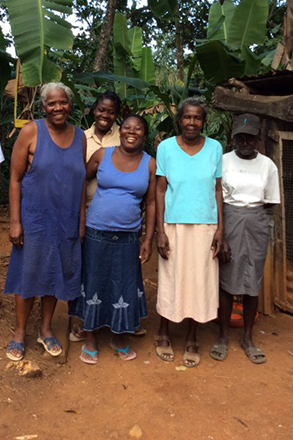The sun is shining down as I make my way to Leon located in the Grand-Anse region of Haiti. There are about 12 women patiently waiting at their farms to show me the progress they’ve made since receiving turkeys from Heifer.
This isn’t the first time I’ve seen or experienced women farmers making progress in their lives. I, too, grew up on a farm where I saw my mother join hands with other women to put my siblings and me through the best schools in the area. I know the importance of women being empowered. It is why I’m here today and why I work for Heifer.

Marie Maude Charles, the president of Fanm Konba de Leon welcomed me with fresh coconut water and proudly took me around her farm. Fanm Konba de Leon is a community-based women’s organization with 37 registered members, all working with Heifer Haiti to inspire positive change in the community of Leon. It was initially established in 2010, but without proper leadership, training and resources, the members were struggling to generate income and make their farms profitable enterprises.
Heifer Haiti began working with the organization in 2013 through our REACH program there and in just one year so much has changed.
Marie is responsible for leading, guiding and directing the members of the organization, creating public awareness to ensure the organization is visible in the community, representing the organization in civic and international organization activities, evaluating success of the members, solving disputes and demonstrating leadership. Not a small task.
“After months of participating in Heifer trainings, I gained a lot of experiences for myself,” Marie shares. “I learned about vaccinations, secure housing for my turkeys, leadership skills, which turkeys bred fastest and general entrepreneur skills.”
After extensive preparation, in November 2013, Marie, together with 29 other women each received a gift of three turkeys, seedlings and seeds from Heifer Haiti. Marie anticipates having 10 mature turkeys by June 2014, which she plans to sell for about $15 each to expand her poultry business.
To prepare for the animals, Marie ensured that all members of the organization diligently attended the trainings conducted by Heifer Haiti. “Finally, after months of training, they received the gifts and are now working their farms,” she says.
The meat and vegetables they now have will provide protein and vitamin-rich diets and a constant source of income—which, for the women, equals recognition in the community.
Marie, 50, and I share our different, yet very similar, worlds. She lives with her husband and five children and wants to give the best education to her children. Marie also wants to own a large poultry farm to ultimately give her family complete financial independence.
She loves living in the rural area and farming—where she has spent most of her life. Marie has no aspirations of seeking employment in the urban areas. She spends most of her time tending to her farm, selling her produce in the marketplace, taking care of her family or working with other members of the organization.
Marie and I discuss what being a “woman” means and agree on one key point: women’s leadership in life across all sectors of the world is essential to building stronger economies. Yet in Haiti, as in many places all over the world, women are not always fully involved, but working together gives us a sense of belonging and more confidence.
As our trip winds down, Marie, with a wide grin shares, “Our collective journey in becoming successful entrepreneurs has just begun.”
I know she is right, and I know that she’ll succeed. I’m honored and excited to watch her journey.
Story by Pamela Nyaga, Heifer Haiti
Photos courtesy of Heifer Haiti